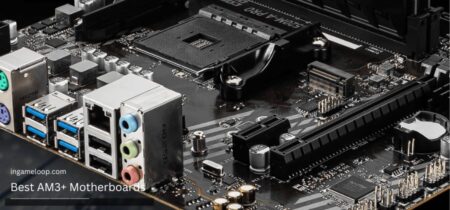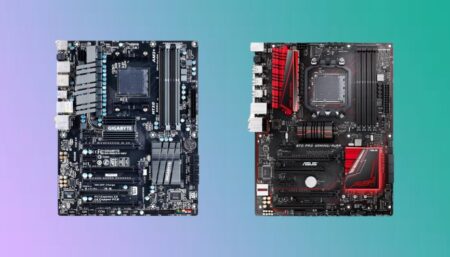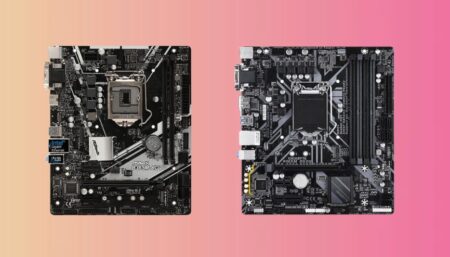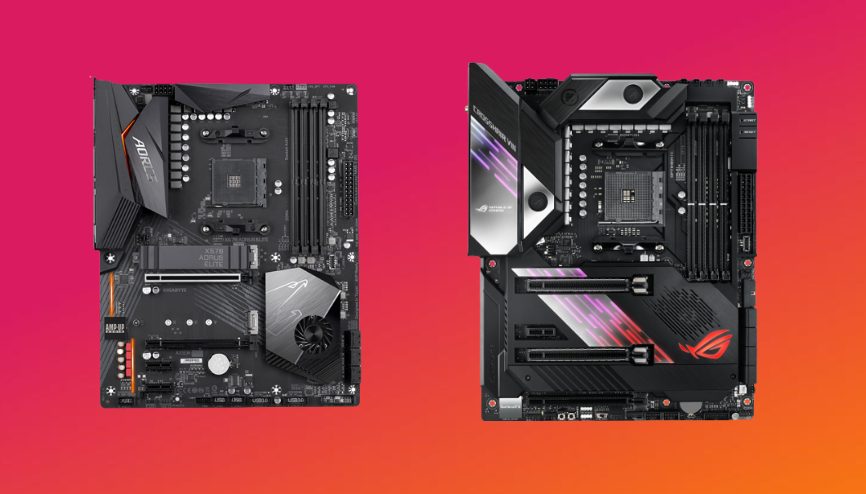
The AMD Ryzen 7 5800X is a high-performance 8-core, 16-thread desktop processor. The Ryzen 7 5800x chipset is the powerful AMD X570, which unlocks the full potential of the Zen 3 architecture. It is part of AMD’s 5000 series lineup aimed at enthusiasts, gamers, and content creators. The Ryzen 7 5800X features a base clock speed of 3.8GHz and can boost up to 4.7GHz, delivering exceptional single and multi-threaded performance. The quest for optimal performance and seamless functionality starts with finding the best motherboard for Ryzen 7 5800X based on high-end features, price, and future-proofing.
Paired with the AMD X570 chipset, it provides PCIe 4.0 support for ultrafast storage and graphics, plus advanced overclocking capabilities to push performance even further. With its leadership IPC and cutting-edge manufacturing process, the Ryzen 7 5800X dominates similarly priced competition from Intel’s 10th generation Core lineup in applications ranging from gaming to 3D rendering and video editing. For professionals and power users seeking a high-end desktop platform that blends performance, efficiency and advanced features. A good-quality Ryzen 7 5800X motherboard is crucial since it’s like a backbone for a computer that holds all the components together. All the elements, like CPU, GPU, RAM, etc., can perform at their peak potential with a suitable motherboard.
| Award | Design | Best | Retailer |
|---|---|---|---|
| Best Gaming Motherboard |  | View | |
| Best X570 Motherboard | 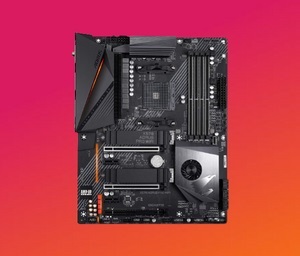 | View | |
| Best Overall Motherboard |  | View | |
| Best Budget Motherboard |  | View | |
| Flagship Choice | 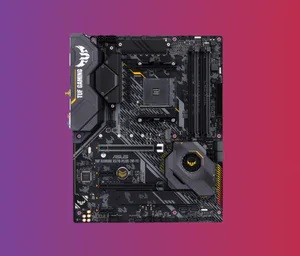 | View | |
| ATX Motherboard Choice |  | View | |
| Micro ATX Choice |  | View | |
| Mini-ITX Motherboard Choice |  | View |
Finding the optimal motherboard to pair with the powerful Ryzen 7 5800X CPU requires careful consideration of several key factors. Firstly, you’ll want a 500-series chipset, like X570 or B550, to unlock the full capabilities of this premium 5000-series processor. You’ll find we’ve thoroughly tested and reviewed a range of suitable motherboards in this article, analyzing their pros, cons, and suitability for the 5800X. Our in-depth buying guide examines all the vital specifications like VRM quality, cooling, form factor, and features. With these insights, you’ll be equipped to select the ideal motherboard to maximize performance, stability, and value for your Ryzen 7 5800X system.
How we Picked Motherboards for Ryzen 7 5800X
When selecting a motherboard for the Ryzen 7 5800X CPU, there were a few key factors we considered. First, we looked at the RAM slots and capacity to ensure ample memory support for gaming and productivity needs. We also compared form factors to find the right fit for different PC builds. Additionally, connectivity was important so there would be sufficient ports for displays, peripherals, and accessories now and in the future.
Finally, we focused on power delivery and VRM specifications to provide stable power to unlock the full potential of the processor. Overall, criteria like memory support, size, I/O options, and power delivery were evaluated to find the best motherboard options to match the performance and demands of the Ryzen 7 5800X.
- How we Picked Motherboards for Ryzen 7 5800X
- Best Motherboards for Ryzen 7 5800X in 2024
- Asus ROG X570 Crosshair VIII Formula
- GIGABYTE X570 AORUS ELITE
- Asus ROG Strix X570-E
- MSI MPG X570 GAMING PLUS
- ASUS TUF Gaming X570-Plus (WI-FI)
- ASUS ROG Strix B450-F
- Asus TUF Gaming B550M-Plus
- Asus ROG Strix X570-I Gaming
- Conclusion
- X570 vs B450 vs B550 – Which One is Suitable for Ryzen 7 5800X
- Price:
- Overclocking:
- Future Proofing:
- Advanced features:
- Verdict:
- Ryzen 7 5800X Motherboard Compatibity
- Related Posts:
- Frequently Asked Questions
Best Motherboards for Ryzen 7 5800X in 2024
Achieve the highest level of performance with our collection of the best motherboards for Ryzen 7 5800X, crafted to improve every element of your computing adventure.

Asus ROG X570 Crosshair VIII Formula
Best Gaming Motherboard
Chipset:AMD 570X | Socket: AM4 | Form Factor: ATX | Memory: 128 GB DDR4 | Memory Speed: 2133 MHz
REASONS TO BUY
✓Dual M.2 and Eight-SATA slots
✓Vast networking options
✓LiveDash OLED
✓Neutral aesthetics
REASONS TO AVOID
✗Expensive
✗No 8-channel audio support
When I upgraded my PC build by pairing my Asus ROG X570 Crosshair VIII Formula motherboard paired with Ryzen 7 5800X CPU, and it has provided me with a stable and smooth gaming experience. The high-quality audio, RGB lighting, and comprehensive watercooling abilities of this mobo are perfect for my needs. It has 14+2 power stages with IR3555 PowIRstages, ProCool II power connectors, microfine alloy chokes and 10K Japanese-made black metallic capacitors that deliver robust and reliable power to my CPU, enabling awesome overclocking potential.
The Accurate Voltage Monitoring function simplifies my overclocking process and tunes the voltage precisely, avoiding any overvoltage or undervoltage issues that could affect system stability. Many competitor mobos lack this handy feature. Moreover, this high-end motherboard gives me super smooth control over my entire system. I can fine-tune and customize every aspect through the Al Suite 3 control panel. Along with buttery smooth performance, this mobo lets me enjoy the fastest transfer speeds.
All I had to do was install more than two PCIe 4.0 storage devices in a Raid configuration. It also provides superior network connectivity with WIFI-6, Bluetooth, Ethernet, etc. I can push the RAM to 4800MHz with no burning issues. The Asus ROG X570 Crosshair VIII Formula is a premium motherboard with tons of great features and performance for my Ryzen 7 5800X build. However, the $799.99 price tag was pretty steep. For those looking for a more affordable option, there are other quality X570 motherboards from Asus and competitors to consider. But for my needs, this high-end mobo was worth every penny.

GIGABYTE X570 AORUS ELITE
Best X570 Motherboard
Chipset: AMD 570X | Socket: AM4 | Form Factor: ATX | Memory: 128 GB DDR4 | Memory Speed: 2133 MHz
REASONS TO BUY
✓Active Chipset Cooling
✓Extended VRM Heatsink
✓Pre-mounted I/O plate
✓Three years warranty
REASONS TO AVOID
✗No debug LED
✗No thunderbolt and port
When I tested GIGABYTE X570 AORUS ELITE motherboard with my new Ryzen 7 5800X build, the results showed that it was a great match. This mobo has a 12+2 phase DrMOS VRM that provides super stable, clean power delivery even when I’m pushing my CPU to its limits through overclocking. The DrMOS is a high-efficiency integrated power stage that reduces power loss and improves transient response compared to traditional MOSFETs.
The enlarged heatsink and thermal guard help keep temperatures in check. The heatsink spans across the VRM and chipset area with a direct touch heatpipe for excellent heat dissipation. The thermal guard prevents throttling and bottlenecks by covering the M.2 slots and dissipating heat before it becomes an issue. I especially appreciate the two PCIe 4.0 x4 M.2 slots that support the latest blazing fast NVMe SSDs like the Samsung 980 Pro.
With PCIe 4.0 offering twice the bandwidth of PCIe 3.0, I’m getting ultra-fast game load times and high frame rate 4K gaming. The high-fidelity audio capacitors also provide rich, immersive sound – the motherboard uses premium capacitors from WIMA and Nichicon Fine Gold. And the audio noise guard with LED trace path lighting isolates those sensitive analog signals from digital noise. With its robust VRM for overclocking, beefy heatsink and waterblock for cooling, dual PCIe 4.0 slots for the fastest SSDs and GPUs, high-quality audio, and customizable RGB lighting, this mobo has it all. The best part is it only cost me $199.99, much lower than some comparable X570 motherboards. For my Ryzen 7 5800X build, the GIGABYTE X570 AORUS ELITE hits the sweet spot of features and value.

Asus ROG Strix X570-E
Best Overall Motherboard
Chipset: AMD 570X | Socket: AM4 | Form Factor: ATX | Memory: 128 GB DDR4 | Memory Speed: 2133 MHz
REASONS TO BUY
✓Outstanding Aesthetic
✓A powerful performance of a motherboard
✓Next-level connectivity and networking
✓Multiple-GPU support
REASONS TO AVOID
✗No voltage monitoring board
✗The active chipset cooler is somehow noisy
With its X570 chipset, Asus ROG Strix X570-E motherboard unlocks the full potential of my 5800X for both gaming and heavy workloads. The memory support is top-notch, with four DIMM slots supporting up to 128GB of DDR4 RAM at speeds up to 5100MHz (O.C.). This provides plenty of bandwidth to feed the 8 cores and 16 threads of my 5800X. Expansion options are abundant as well, including eight SATA ports and three PCIe 4.0 M.2 slots for super fast storage, one of which supports both PCIe and SATA modes.
The M.2 slots have heatsinks to prevent thermal throttling and speed things up. There’s also one PCIe 4.0 x16 slot for my graphics card, supporting NVIDIA 2-Way SLI or AMD 3-Way CrossFireX configurations. An additional PCIe 4.0 x16 slot (max x4 mode) and two PCIe 4.0 x1 slots allow me to expand as needed. Power delivery is handled by a beefy 12+4 phase design with high-quality alloy chokes and durable capacitors. This keeps my 5800X fed with clean, stable power, even when pushing past the boost clock through overclocking. The comprehensive cooling system with an active chipset heatsink, MOS heatsink, dual M.2 heatsinks, and a water pump header keeps everything running cool. I can control the cooling with ASUS Fan Xpert 4 or directly in the UEFI BIOS.
Connectivity covers everything I need in a high-end motherboard like Realtek 2.5G LAN, Intel Gigabit LAN, Bluetooth 5.0, fast USB ports, HDMI 2.0b, DisplayPort 1.2, and crystal clear SupremeFX audio with the S1220A codec. The WiFi 6 and LAN features work with GameFirst V software for optimized, lag-free online gaming. The SupremeFX audio delivers audiophile-grade sound with dual op amps, impedance sense, DTS, and Sonic Studio III.
MSI MPG X570 GAMING PLUS
Best Budget Motherboard

Chipset: AMD X570 | Socket: AM4 | Form Factor: ATX | Memory: 128 GB DDR4 | Memory Speed: 2666 MHz
REASONS TO BUY
✓Excellent Board
REASONS TO AVOID
✗Defective M.2 Heatsink design
When testing Mobos for my new Ryzen 7 5800X gaming build, I wanted to test a budget-friendly X570 motherboard that didn’t compromise on performance. The MSI MPG X570 Gaming Plus turned out to be an amazing option that fit my needs perfectly. The X570 chipset provides full compatibility to unlock the power of my 5800X, which is one of the best CPUs out there right now for both gaming and productivity. This board can handle up to a beefy 128GB of RAM clocked at 4400MHz in dual-channel mode, giving my 8 core, 16 thread 5800X plenty of memory bandwidth to work with.
There are great expansion options too, like a PCIe 4.0 x16 slot ready for the latest graphics cards, six SATA ports for storage, and two M.2 slots – one PCIe 4.0 and one PCIe 3.0 – that use MSI’s M.2 Shield Frozr to prevent thermal throttling. The 8+2 power phase design and 60A MOSFETs deliver super clean, stable power to my 5800X, even when I’m pushing things with overclocking or Precision Boost Overdrive. While it can’t compete with premium X570 boards, the VRM is easily up to the task for a 5800X, as shown by its solid overclocking with a mid-range Ryzen 7 3700X.
Connectivity covers the basics I need with speedy Gigabit LAN, fast USB 3.2 Gen 2 ports (Type-A and Type-C), and crisp onboard audio powered by Audio Boost 4. WiFi would’ve been nice, but a wired internet connection works fine for my setup.
Related: Best Motherboards for Ryzen 5 5600G
ASUS TUF Gaming X570-Plus (WI-FI)
Flagship Choice

Chipset: AMD 570X | Socket:AM4 | Form Factor: ATX | Memory: 128 GB DDR4 | Memory Speed: 4400 MHz
REASONS TO BUY
✓Best cooling system
✓TUF multi-grade protection
✓Strong six-layer PCB
✓USB 3.2 Gen 2 Type-A and Type-C
REASONS TO AVOID
✗No pre-installed I/O panel
✗No WIFI 6
One of the main advantages of ASUS TUF Gaming X570-Plus is the robust power design, consisting of 12+2 Dr. MOS power stages, ProCool sockets, military-grade TUF components, and Digi+ VRM. This combo delivers super stable, clean, efficient power to my CPU, even when I’m pushing things with overclocking. I’ve been able to hit some nice high overclocks without any stability issues thanks to this board. The 6-layer PCB also improves signal quality and reduces interference.
The comprehensive cooling system is another big benefit, including an active chipset heatsink, a beefy VRM heatsink, an M.2 heatsink, and hybrid fan headers. The chipset fan keeps things cool even under heavy workloads, while the VRM heatsink’s large surface area and thermal pads dissipate heat from the power stages. The M.2 heatsink prevents throttling of my PCIe 4.0 SSDs when they’re blazing fast transferring data. The hybrid headers allow both PWM and DC case fans, controlled through Fan Xpert 4 or the BIOS.
Connectivity is also ample for my needs, both internal and external. There are four DIMM slots supporting up to 128GB of DDR4 RAM clocked at 5100MHz (OC), providing tons of bandwidth for gaming and multitasking. With two PCIe 4.0 x16 slots for AMD CrossFireX multi-GPU, two M.2 slots (one PCIe 4.0 x4 for lightning storage), and eight SATA ports, this TUF board checks all the boxes that the best x570 motherboard for a 5800X should have. The two RGB headers let me customize lighting effects too.
ASUS ROG Strix B450-F
ATX Motherboard Choice

Chipset: AMD B450 | Socket: TR4 | Form Factor: ATX | Memory: 64 GB DDR4 | Memory Speed: 3200 MHz
REASONS TO BUY
✓Cheap Motherboard
✓Easy to install and handle
✓Fascinating RGB lighting and design
✓Cooler by design
REASONS TO AVOID
✗No WIFI and Bluetooth
✗Only 64GB of memory
✗Not built for exceptional overclocking
After thorough testing, I found that the ASUS ROG Strix B450-F mid-range motherboard delivers solid performance and features at an affordable price point when coupled with the 5800X. The AM4 socket on the B450-F had no issues supporting the 8-core/16-thread 5800X, and it will also work with other 3000 and 5000 series Ryzen chips. With four DIMM slots, I was able to install up to 128GB of DDR4 RAM running at speeds up to 4400MHz to fully take advantage of the 5800X’s speedy memory controller.
Connectivity checked all the right boxes for me with ample USB 3.0 and 3.1 ports, six SATA 6Gbps connectors, and two M.2 slots ready for fast NVMe SSDs. A downside I noticed is the lack of PCIe 4.0 support. The B450-F is still limited to PCIe 3.0, which slightly impacts SSD speeds when paired with the 5800X. It also lacks integrated Wi-Fi and Bluetooth, but you do get an Intel gigabit LAN port with surge protection.
Audio quality really impressed me with the SupremeFX 8-channel codec and Japanese capacitors. I found decent overclocking potential with the 5800X thanks to 5-way optimization and robust power delivery. The black PCB with grey accents and understated RGB lighting adds to the board’s mature aesthetic.
Asus TUF Gaming B550M-Plus
Micro ATX Choice

Chipset: AMD B550 | Socket: AM4 | Form Factor: Micro ATX | Memory: 128 GB DDR4 | Memory Speed: 4400 MHz
REASONS TO BUY
✓Good overclocking
✓WIFI and LAN support
✓Best audio PCB layers
✓Robust motherboard
REASONS TO AVOID
✗Fewer headers
✗Limited bandwidth
✗Only four SATA ports
After extensive hands-on time, I found this mini-ITX board makes for an excellent compact platform when building a system around the powerful 8-core/16-thread Zen 3 CPU. Despite its small size, the X570-I delivers competitive performance and features that complement the 5800X beautifully. The X570 chipset provides full support for the 5800X without any compromise. I was able to install two DIMM slots supporting up to 64GB of DDR4 RAM clocked at an impressive 5100MHz – plenty of speed to take full advantage of the 5800X’s fast memory controller.
Connectivity is ample for a mini-ITX board. I appreciated the rear I/O USB 3.2 ports, PCIe 4.0 M.2 slots, and integrated Wi-Fi 6 and Bluetooth 5.0. The 8+2 power phase design delivers stable power for overclocking the 5800X to its limits. ASUS’s advanced 5-way optimization software helps dial in peak performance through automatic or manual tuning. I also liked the pre-installed I/O shield and heatsinks on the VRMs, chipset, and M.2 slots which check the boxes for cooling and build convenience.
The only downside of the mini ITX size is less expansion compared to a full ATX board. However, the Strix X570-I manages to pack everything you need into a small footprint to create a powerful and portable Ryzen 7 5800X gaming rig or workstation. If you want cutting-edge Zen 3 performance in a space-saving package, this little motherboard is up to the task. Overall, I highly recommend the ASUS ROG Strix X570-I Gaming for 5800X builders looking to maximize performance in a mini-ITX build.
Asus ROG Strix X570-I Gaming
Mini-ITX Motherboard Choice

Chipset: AMD 570 | Socket: AM4 | Form Factor: Mini-ITX | Memory: 64 GB DDR4 | Memory Speed: 2133 MHz
REASONS TO BUY
✓Plenty of USB ports
✓WIFI 6 and 2.5 LAN
✓Three years of warranty
REASONS TO AVOID
✗A few fan headers
✗No ESD ( Electrostatic Discharge)
I was eager to test out the ASUS ROG Strix X570-I Gaming mini-ITX motherboard paired with AMD’s powerful Ryzen 7 5800X processor. After extensive testing, I found this motherboard to be an excellent match for the 8-core/16-thread 5800X, providing robust cooling, PCIe 4.0 support, immersive audio, and sleek aesthetics ideal for compact rigs. The comprehensive cooling system on the X570-I prevents thermal throttling when overclocking the 5800X to its limits. It features VRM and chipset heatsinks with fans, an M.2 SSD heatsink, and a backplate to dissipate heat. The two PCIe 4.0 x4 M.2 slots allow you to maximize the 5800X’s bandwidth for lightning-fast NVMe SSD storage.
With the SupremeFX S1220A codec, optimized op amps, and Sonic Studio III software, I enjoyed pristine sound quality perfect for games and multimedia when paired with the 5800X. The RGB lighting is highly customizable for a stylish gaming setup. Reliable Intel networking plus Wi-Fi 6 and Bluetooth 5 provide fast and stable connectivity.
The cyberpunk-inspired black PCB with metallic branding and convenient component layout tops off the modern aesthetic that perfectly complements the 5800X’s performance. If you’re looking to build a powerhouse small form factor gaming rig or workstation around this Zen 3 CPU like I did, the feature-packed ASUS ROG Strix X570-I Gaming is an outstanding choice to unlock the 5800X’s full potential in a mini-ITX form factor.
Related: Best Motherboards for RX 6700 XT
Conclusion
All the necessary details have been mentioned above on this product. Suppose you read the post carefully, so you must know which MOBO will suit you. Still, if you are confused, list the needed functions and budgets. After this, filter out the one closest to your requirements.
X570 vs B450 vs B550 – Which One is Suitable for Ryzen 7 5800X
If you are planning to build a PC with the AMD Ryzen 7 5800X processor, you might be wondering which motherboard chipset to choose: X570, B450, or B550. These three chipsets are compatible with the AM4 socket, but they have different features and performance levels. In this guide, we will compare the X570, B450, and B550 chipsets and help you decide which one is best suited for your Ryzen 7 5800X PC.
Price:
The X570 motherboards are the most expensive among the three, ranging from $150 to $700. The B550 motherboards are slightly cheaper, starting from $100 to $300. The B450 motherboards are the most affordable, costing between $70 and $160. However, price is not the only factor to consider, as you also need to look at the features and performance of each motherboard.
Overclocking:
The X570 motherboards offer the best overclocking potential for Ryzen 7 5800X, as they have more power phases, better VRM cooling, and more BIOS options than the other two. The B550 motherboards are also capable of overclocking, but they have fewer power phases, lower VRM quality, and less BIOS features than the X570. The B450 motherboards are the least suitable for overclocking, as they have the lowest power delivery, VRM cooling, and BIOS options among the three. Moreover, some B450 motherboards will not support Ryzen 7 5800X at all while some require a BIOS update to do so.
Future Proofing:
The X570 and B550 motherboards are both future proof, as they support PCIe 4.0, which is the latest standard for data transfer between devices such as graphics cards, SSDs, and network adapters. PCIe 4.0 offers twice the bandwidth and speed of PCIe 3.0, which is what the B450 motherboards use. PCIe 4.0 also enables faster and smoother online gaming, as well as more efficient and reliable data storage. Additionally, both X570 and B550 motherboards support Ryzen 5000 series processors (including Ryzen 7 5800X) out of the box, without needing a BIOS update. The B450 motherboards do not support PCIe 4.0, and will not support Ryzen 5000 series processors at all, or require a BIOS update to do so.
Advanced features:
The X570 motherboards have the most advanced features among the three, such as more USB ports (including USB 3.2 Gen 2), more SATA ports, more M.2 slots (some with heatsinks), more fan headers, more RGB headers, better audio codecs, better LAN chips, better WiFi modules, and more onboard buttons and switches. The B550 motherboards have some of these features as well, but they have fewer or lower quality versions of them than the X570. The B450 motherboards have the least advanced features among the three, as they lack some or all of these features that the X570 and B550 have.
Verdict:
Based on these criteria, I think that the X570 motherboard is the most suitable for Ryzen 7 5800X processor, as it offers the best performance, overclocking potential, future proofing, and advanced features among the three. However, it is also the most expensive option, so if you are on a tight budget or do not need all of these features, you can consider the B550 motherboard instead. The B550 motherboard is a good balance between price and performance, as it supports PCIe 4.0 and Ryzen 5000 series processors out of the box, and has some decent overclocking and advanced features as well. The B450 motherboard is the least suitable option for Ryzen 7 5800X processor, as it does not support PCIe 4.0 and does not support Ryzen 5000 series processors at all or require a BIOS update to do so. It also has the lowest overclocking potential and advanced features among the three. Therefore, I would not recommend it unless you are on a very low budget or do not care about these features at all.
Ryzen 7 5800X Motherboard Compatibity
The topic of ryzen 7 5800x motherboard compatibility is a relevant one for anyone who wants to build a PC with the AMD Ryzen 7 5800X processor. This CPU is part of the Ryzen 5000 Series and offers excellent performance for gaming and productivity. It has 8 cores and 16 threads, and can boost up to 4.7 GHz. However, not all motherboards are compatible with this processor, and some require a BIOS update to work properly.
One of the main factors that determine the compatibility of a motherboard with the Ryzen 7 5800X is the chipset. The chipset is a set of integrated circuits that controls the communication between the CPU and other components, such as memory, storage, graphics, and peripherals. The Ryzen 7 5800X is compatible with AMD’s latest X570 and B550 chipsets1. These chipsets offer better performance and support for PCIe 4.0, which allows for faster data transfer speeds.
Another factor that affects the compatibility of a motherboard with the Ryzen 7 5800X is the BIOS. The BIOS is a firmware that initializes and configures the hardware components of a PC before loading the operating system. Some motherboards have an older BIOS version that does not recognize the Ryzen 7 5800X, and need to be updated to work with it. However, updating the BIOS can be risky and require another compatible CPU to perform the update. Therefore, it is advisable to look for motherboards that have a special feature that allows you to update the BIOS without a CPU or RAM installed. These motherboards have a dedicated USB port and a button that can flash the BIOS from a USB drive.
Related Posts:
- Best Motherboards for i5 9400F
- Best Motherboards For i7-11700K
- Best Motherboards For i7-10700K
- What Is An ATX Motherboard
- What Is AAFP On The Motherboard
Frequently Asked Questions
Is the Ryzen 7 5800X worth it?
Yes, the Ryzen 7 5800X is a worthy processor to have. This CPU is optimized to provide users with robust performance with the help of its eight cores and sixteenth threads. Further, the processor gives you an excellent overclocking speed while keeping the temperature stable. The graphics and audio seem to be perfect and organized.
What motherboards are compatible with Ryzen 7 5800X?
The Ryzen 7 5800X is compatible with AM4 socket motherboards based on the AMD 500 series chipsets, such as X570 and B550. Examples of compatible motherboards include the ASUS ROG Strix X570-E Gaming, MSI MPG X570 Gaming Pro Carbon WiFi, and Gigabyte X570 Aorus Elite. BIOS updates may be required for compatibility, so it’s essential to check before purchasing.
What motherboard should I get for Ryzen 7 5800X?
For the Ryzen 7 5800X, recommended motherboards include the ASUS ROG Strix X570-E Gaming. These motherboards offer strong performance, features, and compatibility with the 5800X. Consider your specific needs, budget, and desired features when choosing the right motherboard.


